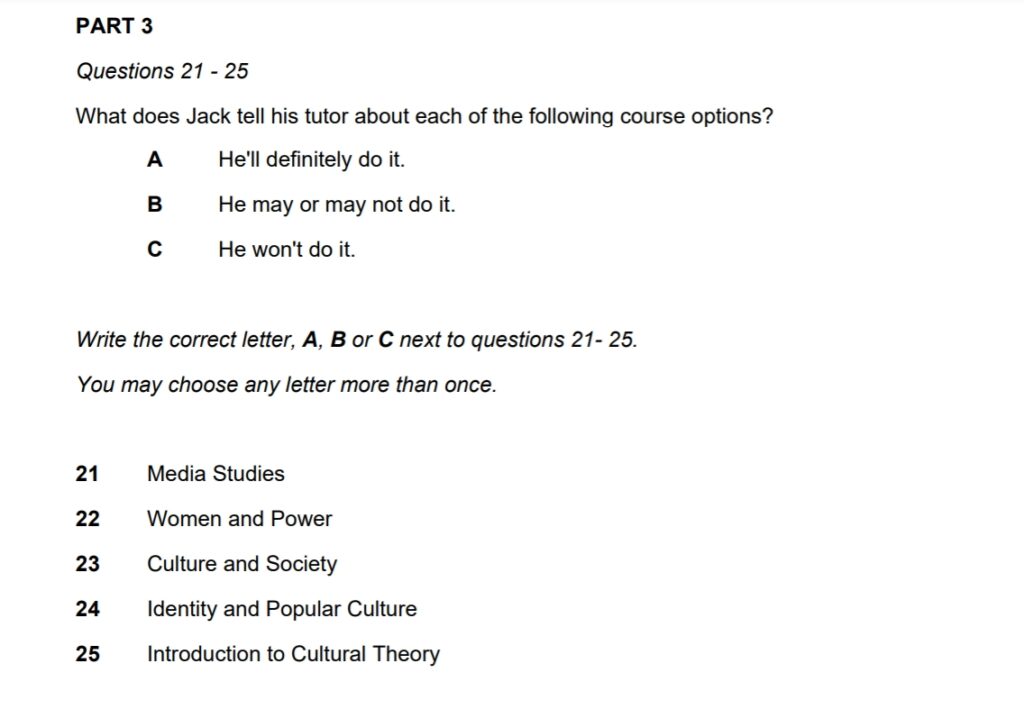Many students who choose to take IELTS wonder whether they can see the questions in the Listening section. IELTS has a great advantage over the other international language exams because candidates have an opportunity to read the questions before they can hear the track. If one chooses to do the paper-based IELTS, the questions will be printed in the question booklet. In the computer-delivered IELTS, the questions are displayed on the screen, and you have to answer them as you listen to the audio. In this blog post, we are going to give some tips on how to exploit this opportunity – benefit from displayed questions in the Listening section.
Questions help you understand the audio track
Usually, we listen to the audio to find the answers to the questions. However, the questions can also tell us a lot about the audio before we listen to it. For example, look at the following IELTS listening task:

If you read the information in the questions, you will know that the audio you are going to listen to will be discussing different cultural events: an opera, a film, and an art exhibition. What is more, you can predict that the speaker is going to talk about when and where the events will take place, and how much the tickets cost. Probably, the speaker will mention different types of arts or make recommendations about places to visit depending on the tastes in arts.
Aren’t you more confident enough now about what you are going to hear? This tip will surely help you with comprehension.
Take IELTS with confidence
Start your IELTS Grade online course
Questions help you understand what to pay attention to
This might sound crystal clear because you will pay attention to the information that will help you answer the questions you have read. What is meant by ‘paying attention to information is being more specific about what you have to listen for. By reading the questions you can sharpen your ears, become more selective and choose only the information that provides or is the answer to the question.

In the task above, you have only three options for answer. It is obvious that Jack will be talking to the tutor about all courses, but you will have to choose only the option (A, B, or C) which is his final decision for each of the courses (21-25). This means that you can repeat the answer if, for example, he decides not to do two of them, etc. So you know you have to listen for words and phrases that either mean he agrees, refuses or hasn’t decided yet (hesitates). Or the speaker can first decide to do the course and then change his mind. So, listen for the final decision.
Questions help you stay focused
Reading questions before listening is, of course, beneficial. However, reading too much is also not very good for you. In the IELTS exam, there can be two sets of questions that refer to the same lecture or conversation. These questions are usually of different types. However, each set of questions is based on a separate part of the conversation or lecture. This means that there are two separate audios as well. That is why it is not a good idea to read all sets of questions before listening because you might get lost and will not remember what to focus on. This automatically will lead you to making mistakes and losing scores.
Read only the list of questions based on the part of a lecture or conversation you are going to hear. How do you know? The instructions are played before every part, and the numbers of questions you have to answer are specified.
Of course, questions in the next parts of the IELTS Listening section become longer, and candidates do not have much time to read and analyse every word. We recommend skimming the questions for keywords and phrases that will help select the most important things and concentrate while listening. To learn the strategies for each question type and to practise with instant feedback from IELTS experts join our online IELTS Academic preparation course.
Subscribe to our IELTS digest
READ IN OUR BLOG:




